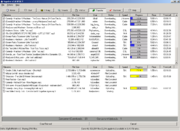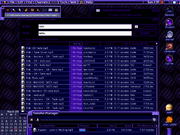Napster

Napster was an online music file sharing service created by Shawn Fanning while he was attending Northeastern University in Boston. The service operated between June 1999 and July 2001.[1] Its technology allowed people to easily share their MP3 files with other participants, bypassing the established market for such songs and thus leading to massive copyright violations of music and film media as well as other intellectual property. Although the original service was shut down by court order, it paved the way for decentralized peer-to-peer file distribution programs, which have been much harder to control. The service was named Napster after Fanning's hairstyle-based nickname.
Napster's brand and logo were purchased after the company closed its doors and continue to be used by a pay service.
| Part of a series on |
| Peer-to-peer file sharing |
|---|
| Timeline |
| Concepts |
| Anonymous P2P Friend-to-friend Darknet Private P2P |
| Networks and services |
| Gnutella / Gnutella2 (G2) FastTrack · Kazaa eDonkey · BitTorrent Mininova · isoHunt The Pirate Bay |
| By country or region |
| Canada |
Contents |
Origin

Shawn Fanning and Sean Parker first released the original Napster in June 1999.[2] Fanning wanted an easier method of finding music than by searching IRC or Lycos. John Fanning of Hull, Massachusetts—Shawn's uncle—ran all aspects of the company's operations for a period from its office on Nantasket Beach. The final agreement gave Shawn 30% control of the company, with the rest going to his uncle. It was the first of the massively popular peer-to-peer file distribution systems, although it was not fully peer-to-peer since it used central servers to maintain lists of connected systems and the files they provided, while actual transactions were conducted directly between machines. Although there were already networks that facilitated the distribution of files across the Internet, such as IRC, Hotline, and USENET, Napster specialized exclusively in music in the form of MP3 files and presented a friendly user interface. The result was a system whose popularity generated an enormous selection of music to download. Napster made it relatively easy for music enthusiasts to download copies of songs that were otherwise difficult to obtain, like older songs, unreleased recordings, and songs from concert bootleg recordings. Some users felt justified in downloading digital copies of recordings they had already purchased in other formats, like LP and cassette tape, before the compact disc emerged as the dominant format for music recordings.
Irrespective of these justifications, many other users simply enjoyed trading and downloading music for free. With the files obtained through Napster, people frequently made their own compilation albums on recordable CDs, without paying any royalties to the artist/composer or the estate of the artist/composer. High-speed networks in college dormitories became overloaded,[3] with as much as 80% of external network traffic consisting of MP3 file transfers. Many colleges blocked its use for this reason,[4] even before concerns about liability for facilitating copyright violations on campus.
Macintosh Version

The service and software program were initially Windows-only, but in 2000 Black Hole Media wrote a Macintosh client called Macster. Macster was later bought by Napster and designated the official Mac Napster client ("Napster for the Mac"), at which point the Macster name was discontinued.[5] Even before the acquisition of Macster, the Macintosh community had a variety of independently-developed Napster clients. Most notably was the open source client called MacStar, released by Squirrel Software in early 2000. The release of MacStar's source code paved the way for third-party Napster clients across all computing platforms, which gave users advertisement-free music distribution options.
Legal challenges

Heavy metal band Metallica discovered that a demo of their song ‘I Disappear’ had been circulating across the network, even before it was released. This eventually led to the song being played on several radio stations across America and brought to Metallica’s attention that their entire back catalogue of studio material was also available. The band responded in 2000 by filing a lawsuit against Napster. A month later, rapper and producer Dr. Dre, who shared a litigator and legal firm with Metallica, filed a similar lawsuit after Napster wouldn't remove his works from their service, even after he issued a written request. Separately, both Metallica and Dr. Dre later delivered thousands of usernames to Napster who they believed were pirating their songs. One year later, Napster settled both suits, but this came after being shut down by the Ninth Circuit Court in a separate lawsuit from several major record labels (see below).
Also in 2000, Madonna, who had previously met with Napster executives to discuss a possible partnership, per Napster's then-CEO and then-head of marketing, and who was rumored to own a percentage of the company, , became "irate" when her single "Music" leaked out on to the web and Napster prior to its commercial release, causing widespread media coverage.[6] Verified Napster use peaked with 26.4 million users worldwide in February 2001.[7]
In 2000, A&M Records and several other recording companies, via the RIAA, sued Napster (A&M Records, Inc. v. Napster, Inc.) for contributory and vicarious copyright infringement under the US Digital Millennium Copyright Act (DMCA).[8] The music industry made the following claims against Napster:
- That its users were directly infringing the plaintiffs' copyrights.
- That Napster was liable for contributory infringement of the plaintiffs' copyrights.
- That Napster was liable for vicarious infringement of the plaintiffs' copyrights.
Napster lost the case in the District Court and appealed to the U.S. Court of Appeals for the Ninth Circuit. Although the Ninth Circuit found that Napster was capable of commercially significant non-infringing uses, it affirmed the District Court's decision. On remand, the District Court ordered Napster to monitor the activities of its network and to block access to infringing material when notified of that material's location. Napster was unable to do this, and so shut down its service in July 2001. Napster finally declared itself bankrupt in 2002 and sold its assets. It had already been offline since the previous year owing to the effect of the court rulings.[9]
Promotional power
Along with the accusations that Napster was hurting the sales of the record industry, there were those who felt just the opposite, that file trading on Napster actually stimulated, rather than hurt, sales. Some evidence may have come in July 2000 when tracks from English rock band Radiohead's album Kid A found their way to Napster three months before the CD's release. Unlike Madonna, Dr. Dre or Metallica, Radiohead had never hit the top 20 in the US. Furthermore, Kid A was an experimental album without any singles, and received relatively little radio airplay. By the time of the record's release, the album was estimated to have been downloaded for free by millions of people worldwide, and in October 2000 Kid A captured the number one spot on the Billboard 200 sales chart in its debut week. According to Richard Menta of MP3 Newswire,[10] the effect of Napster in this instance was isolated from other elements that could be credited for driving sales, and the album's unexpected success suggested that Napster was a good promotional tool for music.
One of the most successful bands to owe its success to Napster was Dispatch. Being an independent band, it had no formal promotion or radio play, yet it was able to tour to cities they had never played and sell out concerts, thanks to the spread of their music on Napster. In July 2007, the band became the first independent band to ever headline New York City's Madison Square Garden, selling it out for three consecutive nights. The band members were avid supporters of Napster, promoting it at their shows, playing a Napster show around the time of the Congressional hearings, and attending the hearings themselves. Shawn Fanning, the founder of Napster, is a known Dispatch fan.
Since 2000, many musical artists, particularly those not signed to major labels and without access to traditional mass media outlets such as radio and television, have said that Napster and successive Internet file-sharing networks have helped get their music heard, spread word of mouth, and may have improved their sales in the long term. One such musician to publicly defend Napster as a promotional tool for independent artists was Dj xealot, who became directly involved in the 2000 A&M Records Lawsuit.[11] Chuck D from Public Enemy also came out and publicly supported Napster.[12] Although some underground musicians and independent labels have expressed support for Napster and the p2p model it popularized, others have criticized the unregulated and extra-legal nature of these networks, and some seek to implement models of Internet promotion in which they can control the distribution of their own music, such as providing free tracks for download or streaming from their official websites, or co-operating with pay services such as Insound, Rhapsody and Apple's iTunes Store.
Shutdown
Napster's facilitation of transfer of copyrighted material raised the ire of the Recording Industry Association of America (RIAA), which almost immediately—on December 7, 1999—filed a lawsuit against the popular service.[13][14] The service would only get bigger as the trial, meant to shut down Napster, also gave it a great deal of publicity. Soon millions of users, many of them college students, flocked to it.
After a failed appeal to the Ninth Circuit Court, an injunction was issued on March 5, 2001 ordering Napster to prevent the trading of copyrighted music on its network.[15] In July 2001, Napster shut down its entire network in order to comply with the injunction. On September 24, 2001, the case was partially settled. Napster agreed to pay music creators and copyright owners a $26 million settlement for past, unauthorized uses of music, as well as an advance against future licensing royalties of $10 million. In order to pay those fees, Napster attempted to convert their free service to a subscription system. Thus traffic to Napster was reduced. A prototype solution was tested in the spring of 2002: the Napster 3.0 Alpha, using the ".nap" secure file format from PlayMedia Systems and audio fingerprinting technology licensed from Relatable. Napster 3.0 was, according to many former Napster employees, ready to deploy, but it had significant trouble obtaining licenses to distribute major-label music.
On May 17, 2002, Napster announced that its assets would be acquired by German media firm Bertelsmann for $85 million. Pursuant to terms of that agreement, on June 3 Napster filed for Chapter 11 protection under United States bankruptcy laws. On September 3, 2002, an American bankruptcy judge blocked the sale to Bertelsmann and forced Napster to liquidate its assets according to Chapter 7 of the U.S. bankruptcy laws.[16]
Current status
After a US$2.43 million takeover offer by the Private Media Group, an adult entertainment company,[17] Napster's brand and logos were acquired at bankruptcy auction by Roxio, Inc. which used them to rebrand the Pressplay music service as Napster 2.0.
In September 2008, Napster was purchased by US electronics retailer Best Buy for US $121 million.[18]
Napster in popular culture
There have been several books that document the experiences of people working at Napster, including Joseph Menn's Napster biography, All the Rave: The Rise and Fall of Shawn Fanning's Napster[19], John Alderman's "Sonic Boom: Napster, MP3, and the New Pioneers of Music,"[20] and Steve Knopper's "Appetite for Self Destruction: The Spectacular Crash of the Record Industry in the Digital Age."[21]
In the 2003 remake of The Italian Job, a flashback depicts Shawn Fanning (playing himself) stealing the program from a computer expert played by Seth Green while the latter is napping, providing a humorous folk etymology for the name. Later in the movie, on the Los Angeles traffic control boards, the phrase "You will never shut down the real Napster" is seen.
An episode of the animated television series Futurama, "I Dated a Robot," centers on the illegal distribution of robotic celebrity clones over the Internet. The organization responsible for this was thought to be named "Nappster." However, it was later revealed that the full name was "Kidnappster," with a piece of tapestry covering "Kid" from the logo.
In the South Park episode "Christian Rock Hard", Stan, Kyle, and Kenny illegally download music for inspiration for their band 'Moop.' They are then caught by police and shown the "horrors" music pirating does to musicians. After seeing this, they start a strike and famous musicians/bands join them, among them: Rancid, Master P, Ozzy Osbourne, Meat Loaf (all four also playing in Chef Aid), Blink-182, Horny Toad, Metallica, Britney Spears, Missy Elliott, Alanis Morissette and The Lords of the Underworld (minus Timmy).
In a 2001 episode of the animated Disney series, The Proud Family, Penny becomes addicted to a site named EZ Jackster, a parody of Napster that allows music to be downloaded illegally.
A tribute song to file sharing "Napster and Gnutella" was written to the tune of "Puff, the Magic Dragon" and distributed via OpenNap servers during the lawsuit.
Musical parodist Johnny Crass satirised the Metallica v. Napster conflict in his song "Internet Sandman", a parody of Metallica's "Enter Sandman". Crass takes a heavily anti-Metallica stance in the parody, and depicts the band and co-founder Lars Ulrich in particular as vengeful property-protectors whose actions over the controversy "screw the fans".
Tom Smith wrote a song called "I Want my Music on Napster," which pokes fun at the fact that due to low album sales, the singer would want his music to be downloaded.
In the action-adventure video game Grand Theft Auto IV, there's a spoof of Napster called Shitster featuring the Napster cat with feces on its head instead of headphones.
In Get Him to the Greek, Russell Brand's character, Aldous Snow, gets mad at Metallica drummer Lars Ulrich (playing himself) and yells at him, saying "Why don't you go and sue Napster, you Danish twat!"
See also
- OpenNap
- Snocap – Company founded by Shawn Fanning and other Ex-Napster Employees
- TekNap - A console napster client to administer open source napster protocol servers
- imeem – Founded and developed by ex-Napster employees, in February 2008 it purchased SNOCAP.
Notes
- ↑ Napster's High and Low Notes - Businessweek - August 14, 2000
- ↑ Sonic Boom: Napster, MP3, and the New Pioneers of Music; John Alderman, pg. 103
- ↑ Fusco, Patricia (March 13, 2000). "The Napster Nightmare". ISP-Planet. http://www.isp-planet.com/politics/napster.html.
- ↑ Anderson, Kevin (26 September 2000). "Napster expelled by universities". BBC News. http://news.bbc.co.uk/1/hi/business/942090.stm.
- ↑ Official Napster Client For Mac OS, OS X || The Mac Observer
- ↑ Borland, John (June 1, 2000). "Unreleased Madonna Single Slips On To Net". CNET News.com. http://news.com.com/2100-1023-241341.html?legacy=cnet.
- ↑ Jupiter Media Metrix (July 20, 2001). Global Napster Usage Plummets, But New File-Sharing Alternatives Gaining Ground. Press Release.
- ↑ 17 U.S.C. A&M Records. Inc. v. Napster. Inc. 114 F. Supp. 2d 896 (N. D. Cal. 2000).
- ↑ .A&M Records, Inc. v. Napster, Inc., 239 F.3d 1004 (9th Cir. 2001). For a summary and analysis, see Guy Douglas, Copyright and Peer-To-Peer Music File Sharing: The Napster Case and the Argument Against Legislative Reform http://www.murdoch.edu.au/elaw/issues/v11n1/douglas111.html
- ↑ Menta, Richard (October 28, 2000). "Did Napster Take Radiohead's New Album to Number 1?". MP3 Newswire. http://www.mp3newswire.net/stories/2000/radiohead.html.
- ↑ "Case Nos. C 99-5183 and C 00-0074 MHP (ADR)". FindLaw.com. http://news.findlaw.com/hdocs/docs/napster/napster/dec_xeal.pdf. Retrieved February 12, 2009.
- ↑ "Rapper Chuck D throws weight behind Napster". Cnet News. May 1, 2000. http://news.cnet.com/2100-1023-239917.html.
- ↑ A&M Records, Inc. v. Napster, Inc., 114 F. Supp. 2d 896 (N.D. Cal. 2000), aff'd in part, rev'd in part, 239 F.3d 1004 (9th Cir. 2001)
- ↑ Menta, Richard (December 9, 1999). "RIAA Sues Music Startup Napster for $20 Billion". MP3 Newswire. http://www.mp3newswire.net/stories/napster.html.
- ↑ 2001 US Dist. LEXIS 2186 (N.D. Cal. Mar. 5, 2001), aff’d, 284 F. 3d 1091 (9th Cir. 2002).
- ↑ Evangelista, Benny (September 4, 2002). "Napster runs out of lives – judge rules against sale". San Francisco Chronicle. http://www.sfgate.com/cgi-bin/article.cgi?file=/chronicle/archive/2002/09/04/BU138263.DTL.
- ↑ "Porno company offers to buy Napster". CNET News.com. September 12, 2002. http://news.com.com/2100-1023-957784.html?tag=fd_top.
- ↑ "The Next Chapter: Best Buy To Acquire Napste121 Million". http://www.paidcontent.org/entry/419-breaking-best-buy-to-acquire-napster-for-121-million/.
- ↑ http://www.sfgate.com/cgi-bin/article.cgi?f=/chronicle/archive/2003/04/27/RV106502.DTL
- ↑ http://www.amazon.com/Sonic-Boom-Napster-Pioneers-Music/dp/0738204056/ref=sr_1_2?ie=UTF8&s=books&qid=1257540242&sr=8-2
- ↑ http://www.rockymountainnews.com/news/2009/jan/02/napster-wounds-the-giant/
Bibliography
- Carlsson, Bengt; Gustavsson, Rune (2001). "The Rise and Fall of Napster - An Evolutionary Approach". Proceedings of the 6th International Computer Science Conference on Active Media Technology
- Giesler, Markus; Pohlmann, Mali (2003). "The Social Form of Napster: Cultivating the Paradox of Consumer Emancipation". Advances in Consumer Research
- Giesler, Markus; Pohlmann, Mali (2003). "The Anthropology of File Sharing: Consuming Napster as a Gift". Advances in Consumer Research
- Green, Matthew (2002). "Napster Opens Pandora’s Box: Examining How File-Sharing Services Threaten the Enforcement of Copyright on the Internet". Ohio State Law Journal 63: 799
- InsightExpress. 2000. Napster and its Users Not violating Copyright Infringement Laws, According to a Survey of the Online Community.
- Ku, Raymond Shih Ray (2001). "The Creative Destruction of Copyright: Napster and the New Economics of Digital Technology". University of Chicago Law Review. doi:10.2139/ssrn.266964. http://ssrn.com/abstract=266964
- McCourt, Tom; Burkart, Patrick (2003). "When Creators, Corporations and Consumers Collide: Napster and the Development of On-line Music Distribution". Media, Culture, & Society 25 (3): 333–350. doi:10.1177/0163443703025003003
- Orbach, Barak (2008). "Indirect Free Riding on the Wheels of Commerce: Dual-Use Technologies and Copyright Liability". Emory Law Journal 57: 409–461. http://papers.ssrn.com/sol3/papers.cfm?abstract_id=965720
Further reading
"The File Sharing Movement" in Jack Goldsmith and Tim Wu, Who Controls the Internet: Illusions of a Borderless World Oxford University Press, 2006, pp. 105–125. isbn: 9780195152661
External links
- Current Napster Website
- Old Napster Inc. Website at archive.org
- TIME: Meet the Napster (October 2000 cover story on Shawn Fanning & Napster
- Newsweek: The Noisy War Over Napster (June 2000 cover story on Shawn Fanning & Napster
|
||||||||||||||||||||||||||||||||||||||